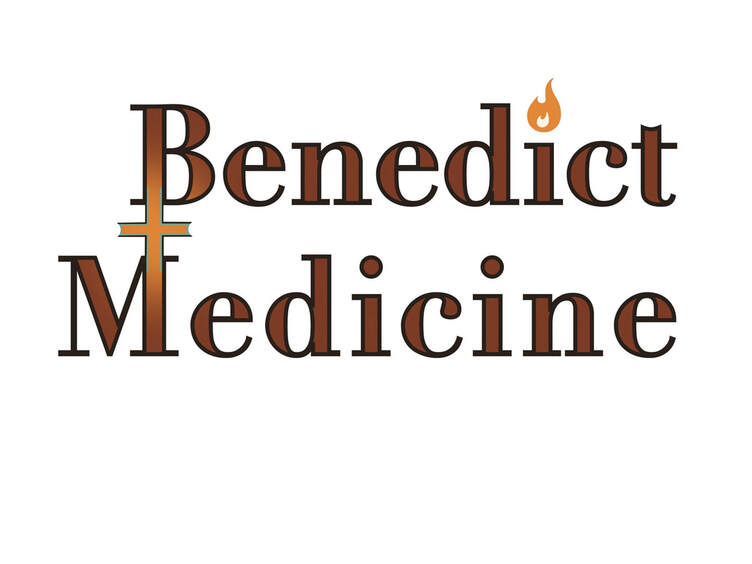|
Welcome to this inaugural blogpost of “In Not Of.” Through this medium I hope to publish reflections on the evening twilight where Christian physicians and patients find ourselves today—able to see just enough to make out the shapes of things, while still knowing the crepuscular lighting is a sign that we are on the verge of being consumed in darkness. By deriving strength from one another, we needn’t be afraid of the dark.
This blog is being written to further the mission of the Benedict Medicine Consortium—to renew the practice of medicine adherent to the principles of Catholic Social Teaching, restoring it as an expression of the corporal works of mercy and a means of evangelization through action. While this may sound novel to us today, it is not a new idea--for countless Christians dedicated to healing over the course of Church history, care for the sick led to the conversion of countless souls to the Faith. In our tumultuous time, Catholic physicians are not only battling the ravages of human disease but also contending with societal decay and a Leviathan administrative state that casts orthodox Christian beliefs as inadmissible in the secular public square. Rather than recognize the existential therapeutic alliance between doctor and patient, our contemporary healthcare leaders believe that medicine should be a top-down, centralized institution ordered toward efficiency and uniformity of processes and outcomes. It must be devoid of any values except the preferences of the patient, as if the profession of medicine had nothing more substantive to offer than what is suggested by business experts in customer satisfaction. Tragically, this erroneous attitude leaves us with physicians who are considered interchangeable technicians, and patients with deep suspicions of the entire medical enterprise. We are witnessing a time when the entire medical profession has adopted a way of thinking that rejects its Hippocratic calling to protect and preserve all human life, as evidenced by nearly all mainstream medical societies’ promotion of abortion as a right and a fundamental good, and the looming rise of physician-assisted suicide. Similarly, stating basic biological truths about the human person—things as heretofore incontrovertible as the immutability of the two sexes—is pilloried as contemptible speech. In fact, an entire field of ‘gender medicine’ has been fabricated in an attempt to pass off flagrantly ideological concepts as respected medical therapeutics. For all the confusion present in the profession of medicine today, we must remember that its errors are not exclusive to medicine, but rather are reflective of errors in the broader culture. This is because medicine is a byproduct of societal norms and values. This proposition is even more unsettling because we have been led to believe that medicine is based on scientifically validated knowledge tempered by the wisdom of a longstanding tradition of medical ethics. In recent years, the confluence of pernicious ideologies in the fields of medicine and education has uprooted the healing profession from its Hippocratic (and later Judeo-Christian) foundations. Despite the starkness of this message, it is not meant to be dourly pessimistic. On the contrary, I believe it represents an opportunity for Catholic physicians to partner with patients and revitalize the medical profession, refashioning it into something much better than it has been. Much like the classical Catholic education movement has arisen as a response to the depredations of the public school system, the Benedict Medicine Consortium seeks to give rise to a similar movement with primary care practiced in accord with Catholic Social Teaching, to offer a bold alternative based on scientifically sound medical care grounded in the truth of faith. As Christians, we are called to relationship—within our families, our communities, and most importantly, with Our Lord Jesus Christ. To this end, I believe that what is needed is a countervailing force in medicine, characterized by the collaboration of Catholic primary care physicians and people of faith who elevate the dignity of the human person, service of neighbor, grass-roots local control, and prudent stewardship of resources as essential principles. Staying focused on these ideas works to deepen our sense of Christian community while providing the world with a practical and bold witness. It’s up to us to stand watch for the first rays of the dawn. In future posts we’ll delve into why the principles of Catholic Social Teaching are so fundamental to the practice of medicine. --James Breen, M.D.
0 Comments
Your comment will be posted after it is approved.
Leave a Reply. |
AuthorThe thoughts and musings of a Catholic family physician regarding medicine, faith and culture. Archives
May 2024
Categories |

 RSS Feed
RSS Feed